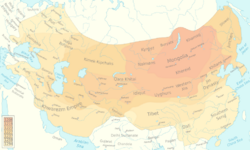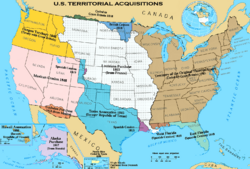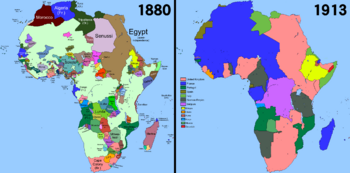Expansionism facts for kids

Expansionism is when a country tries to get more land. This usually happens by using its military to take over new territories. It can also involve creating an empire or setting up colonies in other places.
Long ago, countries often took land just "because they could." They believed that if they were strong enough, they had the right to take what they wanted. This often meant that people living in those lands were forced out, made slaves, or even killed.
As ideas about countries and human rights changed, new reasons for expansion appeared. Sometimes, countries said they were taking back lands they had lost. Other times, they claimed they were uniting people who shared the same background or history. Some believed they were meant to expand, like the idea of a "manifest destiny" or a "Promised Land" given by a higher power.
Contents
Why Do Countries Expand?
Some thinkers have tried to explain why countries expand.
- Ibn Khaldun, a historian, believed that new powerful leaders and their groups often try to expand as much as possible. This is because they have strong unity and purpose.
- Crane Brinton, who studied revolutions, thought that big changes in a country, like a revolution, can make it want to expand. Examples include Stalinist Russia, the early United States, and Napoleon's empire.
Sometimes, leaders on the edges of a country might take new areas without permission from their bosses. Once these areas are taken, it becomes very hard for the main leaders to give them back. This is because of the effort already put in, pressure from their own people, and national pride.
Famous Examples of Expansion

Many parts of the world have seen expansionism throughout history.
- Early Muslim Empires: The spread of Islam began with early conquests. Later, different caliphates (Islamic empires) expanded their lands. The Ottoman Empire also grew a lot in the 1400s and 1500s. They famously conquered Constantinople in 1453, ending the Eastern Roman Empire.
- Russian Expansion: In the 1800s, Russian Czar Nicholas I led many wars to gain land. He fought against Persia and Turkey. He also crushed rebellions in places like Caucasus and Poland. Russian troops even went into Austria-Hungary to stop a revolt there. Russia also tried to make minority groups more like Russians, a policy called Russification.
- Italian Fascism: In Italy, Benito Mussolini wanted to create a new New Roman Empire around the Mediterranean Sea. Italy invaded Ethiopia in 1935 and Albania in 1938. Mussolini used the idea of Spazio vitale ("living space") to justify taking more land. This was similar to Germany's idea of Lebensraum.
- Nazi Germany: After 1937, Nazi Germany under Adolf Hitler took over areas like Sudetenland and Austria. They also occupied the Czech lands. After World War II started, Germany and the Soviet Union divided Poland. Germany then invaded the Soviet Union in 1941, seeking more "living space" for the German people.
- The Scramble for Africa: In the late 1800s, European powers rapidly took control of almost all of Africa. This period is known as the Scramble for Africa. This was a very aggressive form of nationalism combined with expansionism.
- American Manifest Destiny: After the War of 1812, the idea of "Manifest Destiny" became popular in America. This was the belief that the United States was meant to expand across the entire North American continent. This led to the Mexican–American War (1846–1848), where the U.S. gained a lot of land from Mexico. This expansion also brought challenges for Native American tribes and led to the spread of diseases.
Ideas Behind Expansion
In the 1800s, some ideas focused on uniting people of the same race or background. These included Pan-Germanism, Pan-Slavism, and Pan-Turkism. Powerful countries like Prussia, the Russian Empire, and the Ottoman Empire used these ideas to justify their plans to expand.
American Ideas of Expansion

The idea of American expansionism was explored by Frederick Jackson Turner in his "Frontier thesis". He argued that the availability of free land in the west helped Americans become economically independent. It also helped create a strong democracy. This success made many Americans believe their "way of life" was superior. This belief attracted millions of immigrants to the country.
Later, the U.S. expanded beyond North America, for example, into the Philippines. President William McKinley wanted to bring peace and order to the Philippines. However, many Filipinos wanted independence, which they eventually achieved in 1946. Some historians also suggest that leaders like McKinley felt pressure to show strength and "manliness" by supporting military expansion.
See also
 In Spanish: Expansionismo para niños
In Spanish: Expansionismo para niños
- American imperialism
- British Empire
- Colonialism
- Early Muslim conquests
- Expansionist nationalism
- Manifest Destiny
- Scramble for Africa, late 19th century
 | William Lucy |
 | Charles Hayes |
 | Cleveland Robinson |


